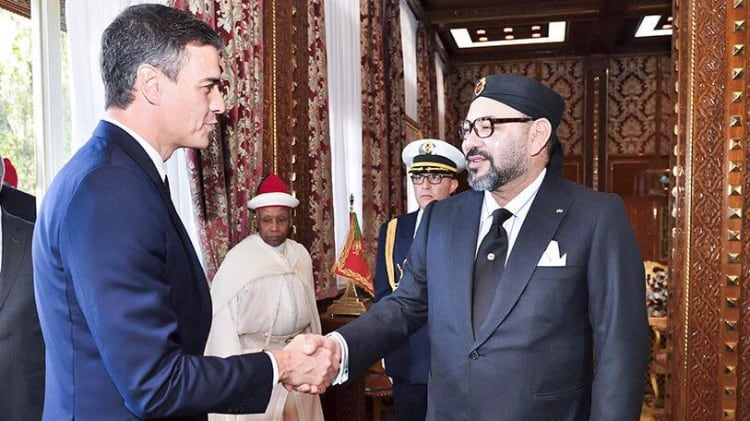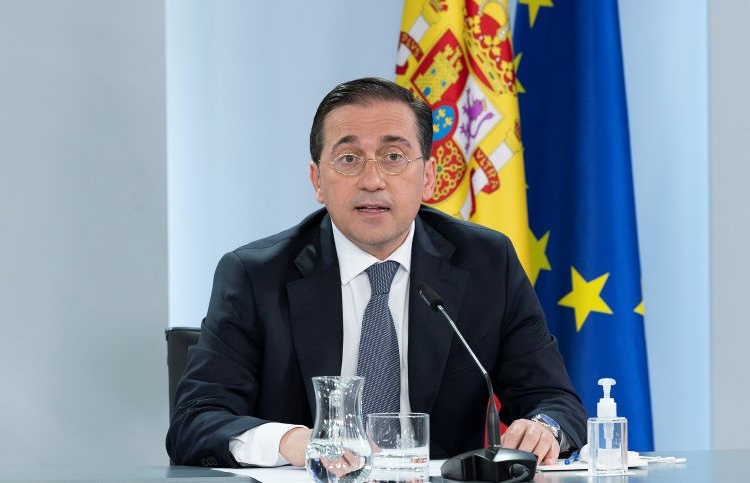The Diplomat
The President of the Government, Pedro Sánchez, will travel to Rabat tomorrow, in response to the invitation made to him days ago by the King of Morocco to stage the recomposition of bilateral relations, deteriorated after the ‘Ghali case’.
Mohammed VI will show Sánchez the courtesy of inviting him to share the ‘Iftar’, the dinner with which Muslims break the Ramadan fast throughout the day.
This was confirmed yesterday by the Minister of Foreign Affairs, José Manuel Albares, who will accompany the head of the Executive on a trip that will last until Friday.
Albares cancelled the trip he was to make to Rabat on 1 March, because hours earlier, Mohammed VI decided that he wanted Pedro Sánchez, who on 14 March had sent him a letter expressing his support for the autonomy plan proposed by Morocco for Western Sahara, to be present at the staging of the new stage in relations.
The Alaouite monarch is very satisfied with the turnaround made by the Spanish government, accepting his demands, and wants to give it as much prominence as possible. He will receive Sánchez, in the middle of Ramadan, a period in which there are usually few official visits, and afterwards he will share the ‘iftar’ with him.
At the press conference following yesterday’s Council of Ministers, Albares considered the invitation to break the fast to be “a gesture of friendship on the part of Mohammed VI, as it is a time when family and close people get together”.
Next Thursday’s meeting will be the second between Sánchez and Mohamed VI, who already met in Rabat on 19 November 2018 during the first official visit to Morocco by the President of the Government.
A bilateral summit was scheduled to be held on 17 December 2020, but was suspended days earlier, citing health security reasons due to the coronavirus pandemic.
In April last year, Spain’s decision to host Polisario Front leader Brahim Ghali in a hospital for humanitarian reasons provoked a reaction from Morocco, which recalled its ambassador to Madrid for consultations and facilitated the massive arrival of migrants through Ceuta and Melilla.
Only Sánchez’s letter in which he described Morocco’s autonomy plan for the Sahara as ‘the most serious, credible and realistic basis’ for a solution to the dispute was accepted by Rabat to end the diplomatic crisis.
The government’s decision, however, was rejected by all parliamentary political groups in Spain, including Sánchez’s partners and ally. And, above all, it provoked a reaction from Algeria, which immediately recalled its ambassador for consultations and has pointed to the possibility of a rise in the price of the gas it supplies to Spain.
Yesterday, Albares wanted to send out a message of calm regarding this possible rise in gas prices, affirming that “Algeria has always fulfilled its contracts”.
The minister stressed that these contracts are private, signed by the Spanish company Naturgy and the Algerian company Sonatrach, but insisted that the Maghreb country “is a strategic partner and has always been a reliable supplier” of gas, with “scrupulous respect” for its commitments.
Albares recalled that Spain cooperates with Algeria in other areas beyond energy, such as security.
Spain currently imports 25% of its gas through Algeria, a figure that has been falling in recent months since the Maghreb-Europe gas pipeline was shut down on 1 November. Most of Spain’s imports come via the Medgaz pipeline, although a growing percentage is imported via liquefied natural gas tankers.







